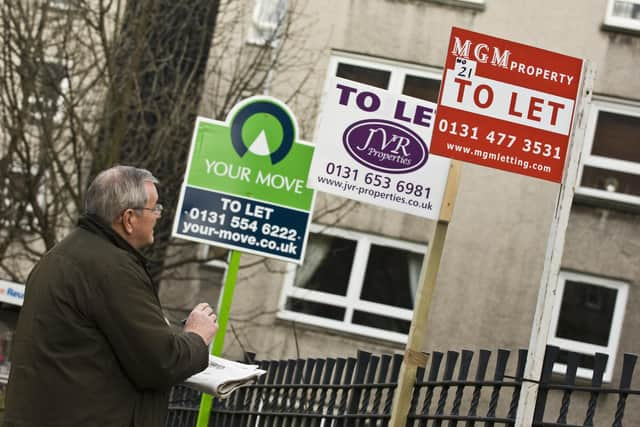Tougher stance on rent controls is on the cards - Martin Devine
The Bill is set to create a duty on local authorities to carry out periodic assessments of the private rental market and make recommendations to the Scottish ministers about the designation of rent control areas, where they consider measures to control rent increases are necessary to protect the interests of tenants.
To facilitate this, landlords will be obliged to give the authorities details of their tenants’ current rent and most recent rent increase and will face penalties for a failure to comply.
Advertisement
Hide AdAdvertisement
Hide AdExisting rent control measures and the continued uncertainty with future regulation are being cited as key reasons not to invest in new rental properties in Scotland which is negatively affecting housing supply. Lost investment has been reported as being in excess of £2.5 billion already and this looks set to rise.


Based on this draft of the Housing Bill, it seems likely to be 2027 at the earliest before there would be clarity on where the Bill’s rent control measures would apply. Such an extended period of uncertainty will not help to ease the chronic housing shortage we have in Scotland nor facilitate investment in better quality housing, which is badly needed.
While at a superficial level a control on rent may seem beneficial for tenants, evidence from other parts of Europe demonstrate that these measures are likely to continue to deter much-needed investment into the private residential market, which leads to an even greater undersupply of good quality housing stock. This will result in rents being driven even higher, thus defeating the aims of the measures.
Although the Bill does not specify the level of rent caps, it states that rent rises would be capped both during and in between tenancies. Rent cannot be increased more than once in any 12-month period, and no rent increase during the first year of a tenancy is permitted. Where a property is not in a rent control area, rent may not be increased more than once in any 12-month period and no increase is permitted in the first year of a tenancy.
The Bill also proposes provisions allowing certain properties to be exempt from rent control area restrictions but details around what would constitute an “exempt property” will be finalised in follow-on regulations.


Other important changes that would be introduced under the proposed legislation could see tenants given greater protection against eviction in certain circumstances, statutory rights to keep pets at a rental property, as well as the right to make alterations to a let property.
The Bill will now be assigned to a parliamentary committee who will examine the legislation and gather views from interested stakeholders. This represents an opportunity for businesses to raise concerns with the legislation or propose changes for MSPs to consider at a later stage in the parliamentary process.
Martin Devine, Partner and property development specialist at Pinsent Masons
Comments
Want to join the conversation? Please or to comment on this article.